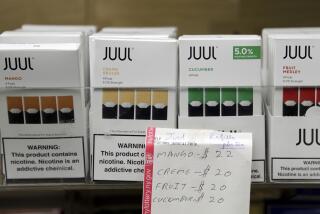Draft Proposal Grants Tobacco Firms Immunity
- Share via
A draft proposal to grant the tobacco industry partial immunity from lawsuits in exchange for billions of dollars in payments to fund anti-smoking programs, compensate sick smokers and reimburse states for smoking-related health-care costs is under discussion by key congressmen, according to officials and lawyers involved in tobacco litigation.
The proposal, which could cost the embattled industry and cigarette smokers more than $100 billion over the next 15 years, would be vastly larger than any previous settlements in product-liability lawsuits, such as those involving asbestos and silicon breast implants.
But critics of the plan argued that its cost is still far less than the industry risks paying if it loses a series of upcoming liability lawsuits. Moreover, the draft proposal includes language shielding the cigarette makers from future legal claims.
Those familiar with the proposal cautioned that it is preliminary and not yet part of an actual bill.
Nevertheless, combatants in the smoking wars have long expected that Congress might impose a comprehensive solution to the $50-billion-a-year industry’s legal woes if it risked becoming engulfed by legal claims.
However, the trial balloon, disclosed Monday by the Wall Street Journal, drew harsh criticism from key players on both sides. It is certain to face close scrutiny by the industry’s congressional friends and foes alike.
The proposal was crafted mainly by lawyers for Mississippi and other states suing cigarette companies to recover Medicaid funds they have spent to treat smoking-related illnesses.
Officials familiar with the proposal said it calls for annual payments of about $6 billion to $10 billion for each of the next 15 years. Most of the money would come from a hefty increase in federal cigarette excise taxes. The exact amount of the settlement would thus depend on cigarette sales, according to one antitobacco lawyer who helped craft the proposal--meaning that its ultimate size would shrink if the antismoking programs funded by the plan are successful.
Of the sum, at least $500 million per year would be provided to the U.S. Department of Health and Human Services to finance antismoking campaigns, officials said. The remainder would be apportioned among the states to beef up their own anti-smoking efforts and repay the cost of treating indigent victims of smoking-related illnesses. Part of the money provided to the states would go into pools to compensate sick smokers, officials said.
Under the plan, regulations announced last week by the Food and Drug Administration to curb youth-oriented tobacco marketing would have the force of law--but the FDA would be prohibited from asserting jurisdiction over the industry or imposing further restrictions on cigarette marketing, officials said.
The plan would eliminate the threat posed to the industry by the proliferating state lawsuits. So far, 14 states and two municipalities--San Francisco and Los Angeles County--have filed such suits. Those cases would be dismissed by act of Congress.
Pending private lawsuits would be able to proceed. These include hundreds of individual claims as well as class-action suits already filed in nine states and the District of Columbia on behalf of millions of allegedly addicted smokers. While details were sketchy, the plan reportedly would limit damages in the existing cases while barring new private lawsuits.
The cigarette companies have never paid any damages to a sick smoker. Two recent cases have resulted in a split decision: A Florida jury last month ordered the Brown & Williamson Tobacco Corp. to pay $750,000 to a retired air traffic controller who contracted lung cancer, but an Indiana jury last week found four cigarette makers not liable for the lung cancer death of an Indianapolis lawyer.
While some key players Monday reserved comment until details of the legislative plan are clarified, others were harshly critical. In a statement, RJR Nabisco Holdings Corp., parent of the country’s second-largest cigarette maker, said the terms of the proposal “are completely unrealistic and do not merit discussion.” Still, the company acknowledged that “a comprehensive legislative solution . . . would certainly merit our attention.”
The proposal was crafted by private attorneys working with Mississippi Atty. Gen. Mike Moore, who on Monday issued a statement of support. But Minnesota Atty. Gen. Hubert H. Humphrey III, who has launched a suit against the industry, called the proposal a bailout.
“Because we are talking about decades of illegal behavior, the numbers in this proposed settlement don’t even begin to add up,” Humphrey said.
An aide to Rep. Henry Waxman (D-Los Angeles), a leading tobacco industry foe, said Waxman considers the proposal “a nonstarter because it would give an unprecedented degree of immunity to an industry that we just recently found out hid information for decades on the danger . . . and addictiveness of [its] product.”
The settlement idea followed discussions last spring between Richard Scruggs, an antitobacco lawyer in Mississippi, and his brother-in-law, U.S. Senate Majority Leader Trent Lott (R-Miss.), who is considered friendly to the industry. Neither Scruggs nor Lott was available for comment Monday.
More to Read
Sign up for Essential California
The most important California stories and recommendations in your inbox every morning.
You may occasionally receive promotional content from the Los Angeles Times.










